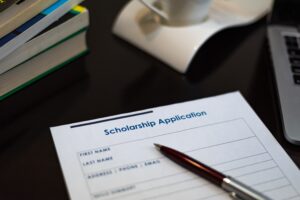Many high school students find work during their time there, from informal opportunities like babysitting, to the classic lifeguard or fast food, or even more competitive internships or more unique positions. Working during high school can be a great experience, and can give you unique skills (plus money, which can be exchanged for goods and services). Of course, getting a job is easier said than done. Many positions ask for two key things: a resume, and a cover letter (plus whatever else their job application entails). Cover letters are a strange thing to write, and their purpose is often opaque to students just beginning to work for the first time. In this article, we’ll explain what cover letters are exactly, and how you can write a great one. Let’s get started!
What are Cover Letters anyway?
Cover letters are a component of many job applications, and can also be referred to as introductory letters or letters of motivation. Their purpose is to introduce applicants to employers, so they can better understand who you are and why you want the job you are applying to.
Traditionally, cover letters fulfilled the following purposes:
- Giving more insight into relevant experience you have. Your resume covers everything you’ve done, but the cover letter has space to give full context to how those skills will work for the desired role.
- Explaining why you want a particular job, and what attracts you to this career.
- Giving more context to anything in your resume or otherwise that employers may need to know, such as additional skills you have.
In addition, many jobs currently use cover letters as a basic test of competency and fluency in language, seeing if you can use words to make your point clearly and succinctly. There is also a trend of using cover letters to prescreen applicants; eliminating those from applying who are unwilling to do the work of writing a cover letter in the first place.
Many companies are also using automated tools to screen applicants for their suitability for positions; reviewing both resumes and cover letters before a human does. This is due to the high volume of applicants some jobs receive.
Generally, however, high school students don’t need to worry about this. Most jobs you will be applying to will not ask for cover letters; Burger King knows you aren’t particularly passionate about hamburgers, they just care that you’ll show up on time and not burn the building down.
There are some occasions where you will need cover letters however, namely when applying to internships. In many ways, the experience of having to write a cover letter is part of the experience of the internship; teaching you how to apply for a job much as the internship itself teaches you about the mechanics of a particular field. While not all positions you apply to as a high school student will want cover letters, there are a significant number that will.
How to Write a Cover Letter
The best way to explain how to write a cover letter is to give you an example letter, and then to explain what it does well. To that end, here is a letter written by a past Ivy Scholars student seeking to apply to an internship. Note that we have edited this letter somewhat to anonymize it.
Example Cover Letter
Dear [Employer],
I am writing to express my keen interest in an internship position with you, which I view as an early-stage leader in leveraging deep learning for the biomechanics of athletes. As a sophomore at Generic High School, I have been steering my academic and extracurricular pursuits towards a future in sports medicine, driven by my fascination with human physiology and kinesiology, and their applications in improving athletic performance and injury prevention.
My passion for the biomechanics of sports is not limited to theoretical knowledge. As an avid tennis player, I struggled with correcting my own form and can empathize with the vast majority of your target customer demographic. This shared perspective enables me to provide potential insights to further enhance the value proposition and identify additional market opportunities. In particular, I have been intrigued by how understanding biomechanics is pivotal for athletes. This led me to continually analyze and optimize me and my teammates’ movements, a practice that aligns closely with your mission to transform sports training through innovative solutions.
My previous experiences, such as my role as an Operations Researcher at Generic High School DECA, have equipped me with skills in research, data analysis, and strategic problem-solving. Specifically, my work on inducing genetic mutations in bacteria colonies and enhancing operations efficiency at a veterans clinic demonstrates my capability to contribute effectively to diverse areas of work, including Research & Development and new product development.
I am particularly excited about the opportunity to work in a company that is at the forefront of integrating AI with sports science. My hands-on experience in tennis and my academic interest in sports medicine provide me with a unique perspective that aligns with your mission to enhance education for athletes and coaches.
Thank you for considering my application. I am eager to bring my diverse skill set to your lab and contribute to your innovative projects. I have attached my CV, and very much look forward to the opportunity to discuss how my background, skills, and interests align with the needs of your team.
Sincerely,
John Doe
Cover Letter Analysis
This cover letter does a lot of things right, so let’s go through it step by step to look at what it does, and why it’s effective. First, it gets right to the point. This is not a standard letter where you spend time on pleasantries first; that is not expected nor necessary. Instead, begin by saying what position you want, and then introducing yourself. Since you are a high school student, this introduction should invariably feature where you are attending school, and what grade you are in.
If you are applying to an internship involving a particular field, you should highlight any coursework you have taken which relates to that field. This is not always possible, especially early in high school.
Your next paragraph should discuss your interest in the field of the internship; why are you interested in this particular subject, and what past experience do you have with it. This can relate to personal experience as the letter above does, or tie in to past learning experiences or classes you have taken, or to your future career goals. Whatever your motivations are, you should express them clearly and concisely.
Follow this up by providing more details about past experiences you have which give you needed skills for the field. These can either be directly related, where you have had positions before doing what this internship requires, or tangentially related. In the letter above, for example, the student writes about how their past experiences have given them the soft and hard skills the internship requires, even if the work is not exactly the same.
Depending on the number of things you have done which are relevant, this could be done in a single or multiple paragraphs. Give each the space it needs to explain the skills you acquired and how they are relevant, but don’t get caught up in the weeds or provide extraneous details.
A brief paragraph near the end should explain what draws you to this opportunity in particular. What about it suits your specific interests, and how will it further your future ambitions? Connect this with how your past experiences have prepared you, and you can aptly demonstrate that you and the position are a perfect match.
Conclude your letter by reiterating your interest in the position, and giving any other needed information. You don’t want to heap effusive praise on the potential employer, but do want to show sincere enthusiasm for the opportunity on offer.
Cover Letters FAQ
So we’ve covered most of what you need to know about writing a cover letter, but some questions come up a lot. Here’s the most common questions we get from students about writing their own cover letters, and the answers to them.
How long should a cover letter be?
Around a page, depending on how much you have to say. It shouldn’t be shorter than half a page, but should also not be longer than a full page. Writing too much often leads to getting into unnecessary detail, while too little doesn’t convey needed information about your experience.
How should you format a cover letter?
Use a professional font (not Comic Sans, definitely not WIngdings), standard 1-inch margins, and 1.5 or 1.15 spacing. The letter itself should be broken up into paragraphs by subject, each of those should be a few sentences in length. Begin and end as a standard letter.
Can you reuse cover letters?
Yes, to an extent. You cannot reuse a cover letter exactly, but usually some minor edits can make a cover letter for one position fit for another. Note that this only works if the positions are similar; for example if you are applying to multiple internships in robotics, you can reuse the same cover letter multiple times. If you are applying for one robotics internship and one internship in theatre, then you will need to rewrite the cover letter entirely.
Be very careful when reusing a cover letter that you do not accidentally call one company by another company’s name. This shows carelessness, and usually gets your application discarded offhand.
Do cover letters actually matter?
For some jobs and internships, yes, they matter a lot. They are how employers judge your experience and fit for a particular role, and let them see what you will bring to the position if it is given to you.
Final Thoughts
Cover letters are not a common thing to need in high school, but they are becoming increasingly prevalent, especially as students seek to apply to ever more internships and opportunities to prepare themselves for college. We hope this article has shown you what a well constructed cover letter looks like, and given you practical tips for writing one yourself.
Before you write a cover letter however, you first must find a job or internship worth your time, one that will teach you important skills and give you enticing opportunities. If you want help finding just such an internship, or drafting and revising your cover letter, schedule a free consultation today to learn how we can help you. We have years of experience helping high school students find the perfect opportunities for them, and are always happy to hear from you.








